QuestionWe recently adopted an 8 month old black lab mix from a family who stated that there were absolutely no problems in terms of the dog being trained to go outside when he needed to eliminate. Shortly after we adopted him, we had him neutered - all was fine with that. And yes, there have been issues with the chewing of some household items, like pillows and socks. On the grand scheme of things, I know labs are chewers, so all in all, I'm not too concerned about that, because as a result, we have made our home much more dog proof. However, there were some issues with leaving him when I needed to run errands. It appears that he was not properly crate trained as a pup, since he eliminated freely both times I left him in his crate to run errands. Then we tried leaving him confined to one room of the house and came home to more accidents and a very damaged blind. We decided the only recourse was to try to let him have the run of the house. To our surprise, it seemed to work really well! About 2 weeks later, however, it seems that he has regressed and was having accidents in the house.
I have the summer off, which works well, since I can be with him for most of the day. However, we will need to have him fully prepared to be alone for 8 hours once September comes. As of now, before I leave the house, I take him outside for half an hour or more and encourage him to "do his business!" If I see him do either, I praise him immediately and give him a treat.
For the last few days, however, he has taken to eliminating on the carpet. And it doesn't seem to matter if we're home or not. Yesterday, for example, he got into the garbage - my fault, absolutely, so I expected him to have to go a number of times today. We went outside first thing and he defecated. I praised him and gave a treat immediately. I remained outside with him for another half hour and then left him inside for roughly another half hour while I ran some errands. When I returned, he had peed on the carpet. I took him outside and we remained there for over an hour. He indicated when he wanted to go back into the house, so we went in. A friend called me and I went into my bedroom for about 5 minutes while I spoke to her on the phone. When I came back out, he had defecated on the carpet.
I should mention that we have only had him for four weeks, so I understand that there may still be some adjustment issues; however, he usually whines at the door whenever he needs to eliminate. So it seems he's getting it right most of the time. Whenever I see him "do his business", I praise him thoroughly and give him a treat. I know there are probably things I am doing wrong, but it is very frustrating when I take him outside for an extended period of time and he doesn't do anything, and then when he comes back in he goes right to it!! I've heard so many differing opinions on what to do when I discover that he has eliminated on the carpet; some people say not to get mad after the fact because he will have no idea why he's being punished; others say to rub his nose in it and get him outside. I don't want to raise a "scared" dog, but he has to realize that peeing in the house in not an acceptable behavior. I do not want to give him up and I am determined to get this right, for both our sakes! Any help that anyone can give would be sooooo much appreciated!
AnswerFirst let me say ''rub their nose in it'' is both barbaric and useless and in this case counter productive. Never correct him unless you catch him in the act. I think the real problems are stress, leadership, and needing more time to bond.
When you are around you need to keep a close eye on the dog. Use closed doors or gates to keep it in the same room as you are, and perhaps as I do, a short chain fastened to the computer desk. If you catch it in the act, give it a sharp ''Ah, ah, ah!'' and take it out. When you can't watch it, crate it.
Try filling a Kong with peanut butter and freezing it. He may be too busy licking the peanut butter out to be stressed and foul the crate. Some of the other things will take time to solve the problem. You can make it easier to cope with fouling the crate until you solve it by putting a grid in it. They are available with the crates, but expensive and hard to find. A piece of closely spaced wire closet shelving from a home supply place is cheaper. I am now using a plastic vegetable bin with plenty of holes drilled in the bottom. It helps block off part of the crate for the smaller puppy.
The key to most behavior problems is approaching things using the dog's natural instincts. Dogs see all the people and dogs in the household as a pack with each having their own rank in the pack and a top dog. Life is much easier if the 2 legged pack members outrank the 4 legged ones. You can learn to play the role of top dog by reading some books or going to a good obedience class. A good obedience class or book is about you being top dog, not about rewarding standard commands with a treat. Start at http://www.dogsbestfriend.com/ For more on being top dog, see http://www.dogbreedinfo.com./topdogrules.htm
Bonding is quite important. Here are some things meant for younger puppies, but if you can do them with him will help. ''Elevation for small puppies: Sit on the floor and gently put your hands around your pup's middle, below his front legs, and lift him up. He is facing you. Hold him for 15 seconds. Repeat until he no longer struggles. If he is past 10-12 weeks, lift his front feet off the ground, but don't pick him up.
Cradling for small puppies: Hold your puppy gently on his back, as you would cradle a small baby. If he struggles, hold him firmly until he quiets for 10-15 seconds. With larger pups, you can do this as your sit on the floor, with your pup between your legs.
Quiet lying down: Place your pup on the floor on his side, with all 4 legs pointing away from you. Use your hands on his neck/shoulder area and middle, to hold him in this position. When he is quiet, praise him. Lengthen the time that you keep him quietly in this position. When he accepts this position well, handle his paws and muzzle, while keeping him quiet.''
The quotes mean this isn't my original work. It is copied from my Puppy Raising Manual. I have long used these or minor variations of them, and they are very effective. You may want to give him a belly rub while he is on his back too. Helps bonding. There is a big difference between him rolling over and demanding a belly rub, and you choosing a time to roll him over and rub his belly. The latter cements your place as pack leader.

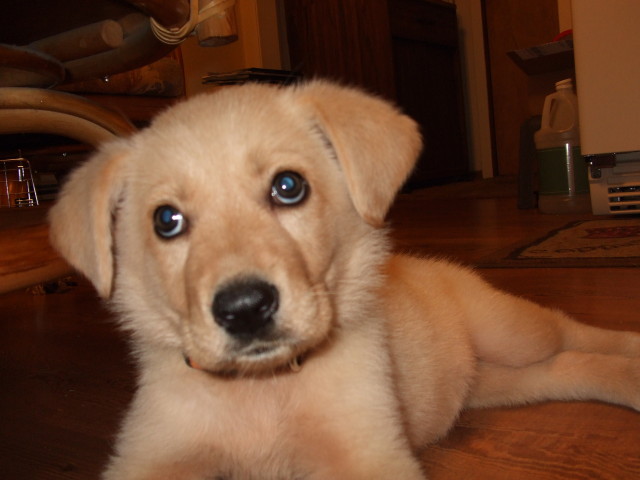 Young pup drinks too much
Question
Hi, Im Roxy & I have
I recently adopted a
Young pup drinks too much
Question
Hi, Im Roxy & I have
I recently adopted a
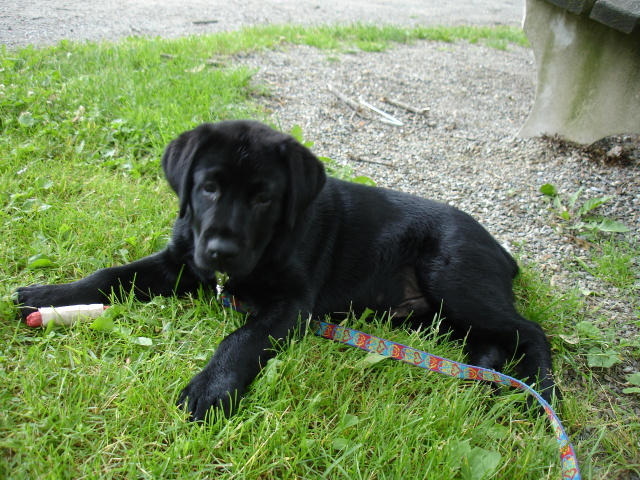 Is my lab puppy growing to fast?
Questionjust hanging out!
QUESTION: I recently t
Is my lab puppy growing to fast?
Questionjust hanging out!
QUESTION: I recently t
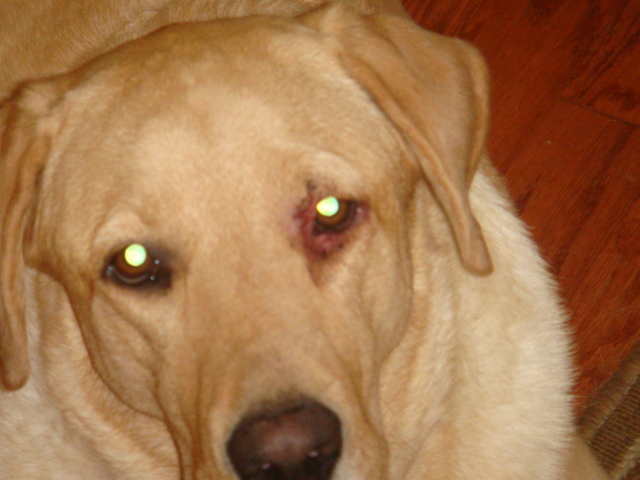 pink rim around eye
Question
his eye
i have a pure yellow lab and hes 3 yrs
pink rim around eye
Question
his eye
i have a pure yellow lab and hes 3 yrs
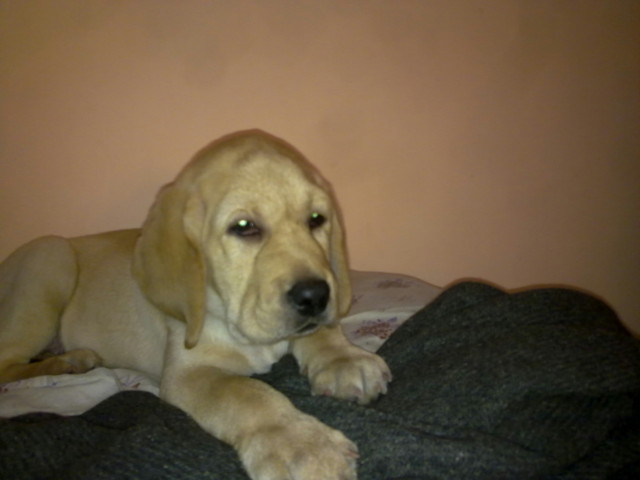 the furious nature of my lab
Question
hero-male lab
he is a fawn coloured 3 and a ha
the furious nature of my lab
Question
hero-male lab
he is a fawn coloured 3 and a ha
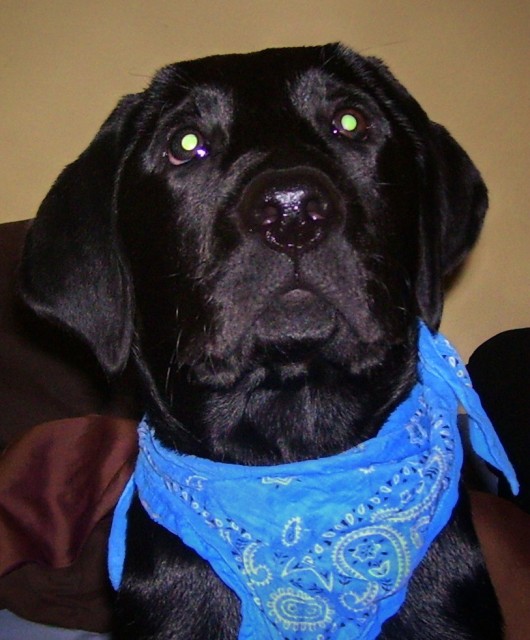 Eating Problems
Question
Datsun
I have a 9 month old,Black male Labrado
Eating Problems
Question
Datsun
I have a 9 month old,Black male Labrado